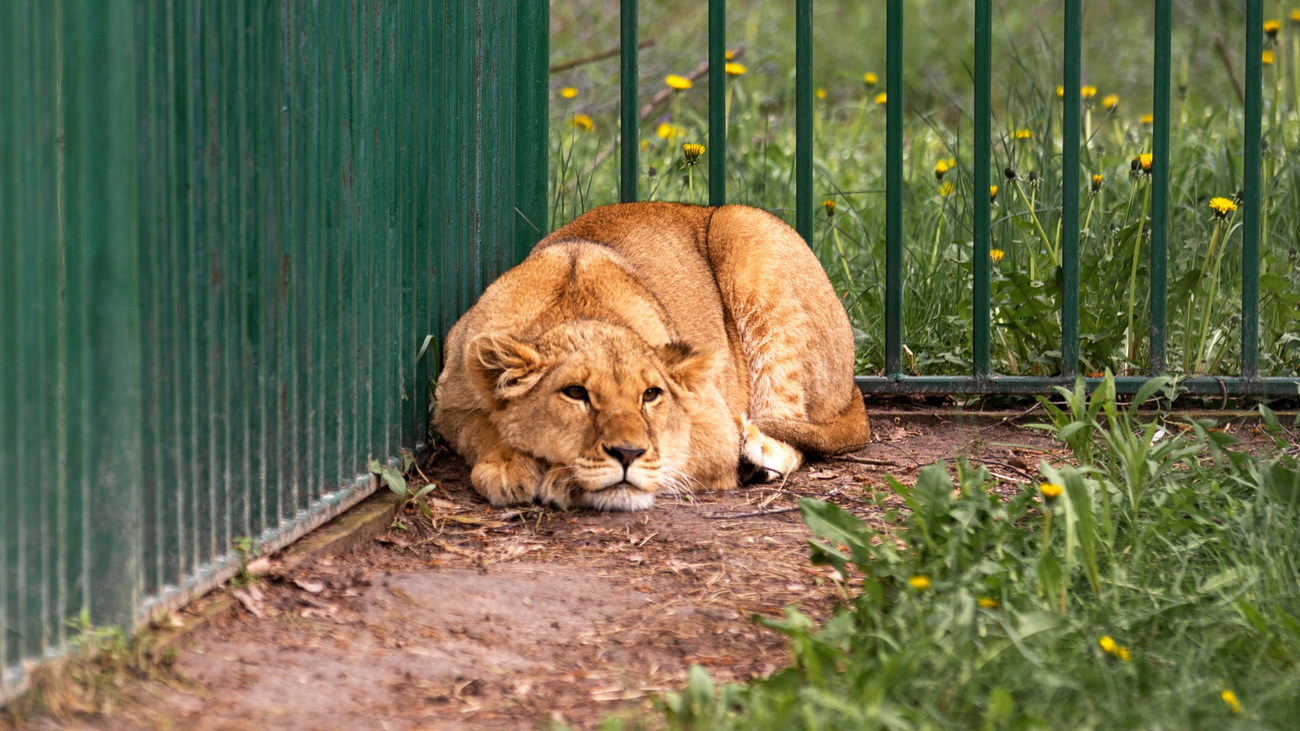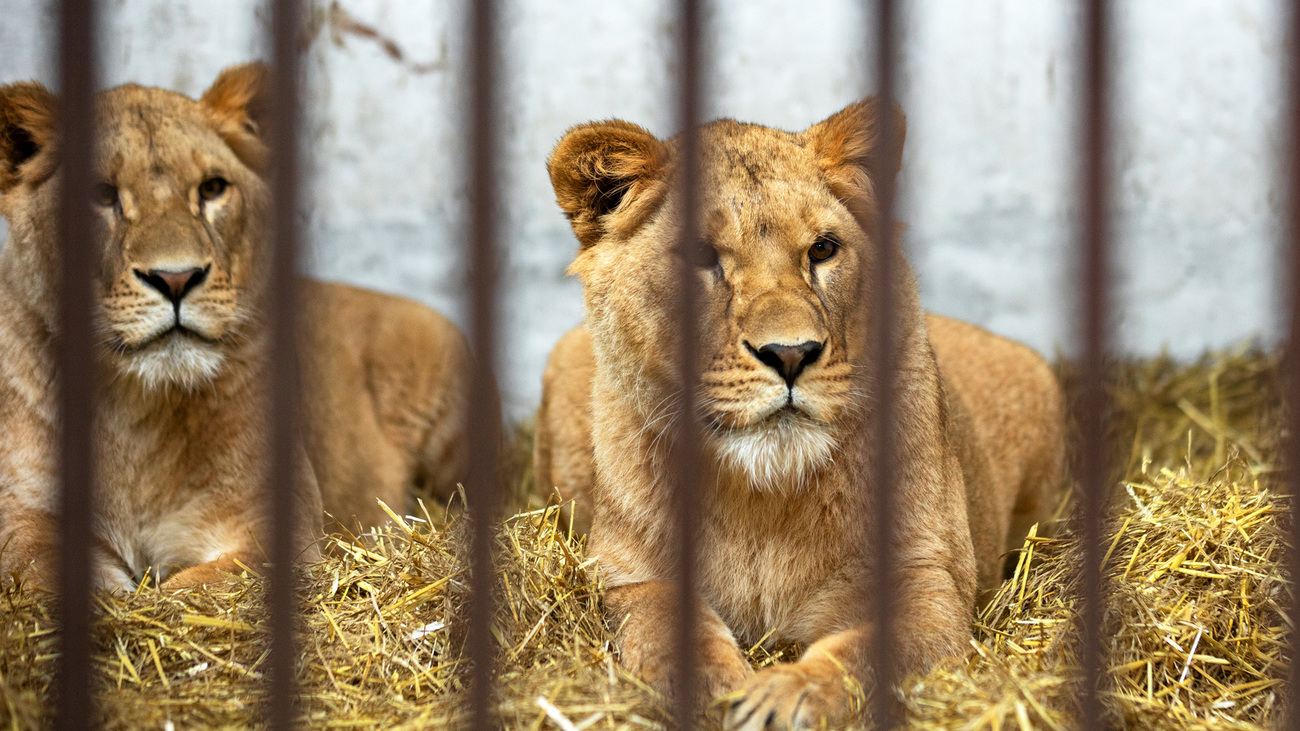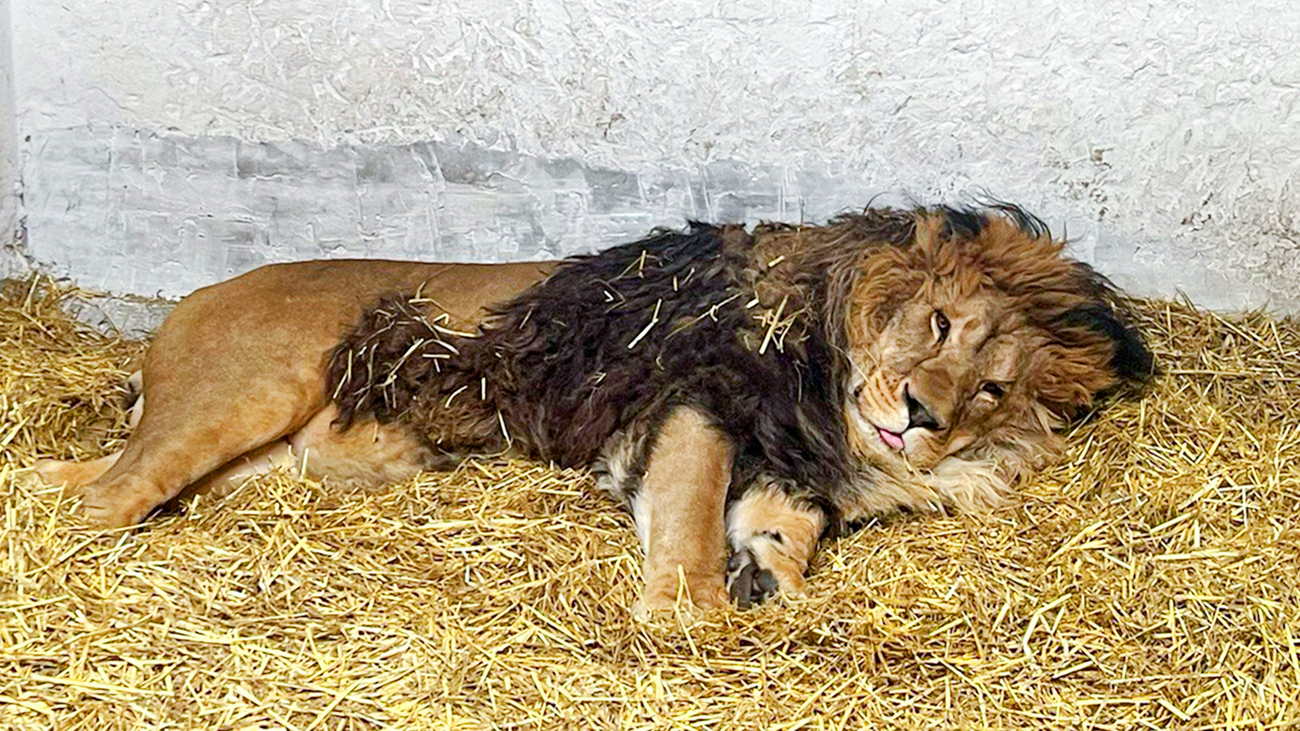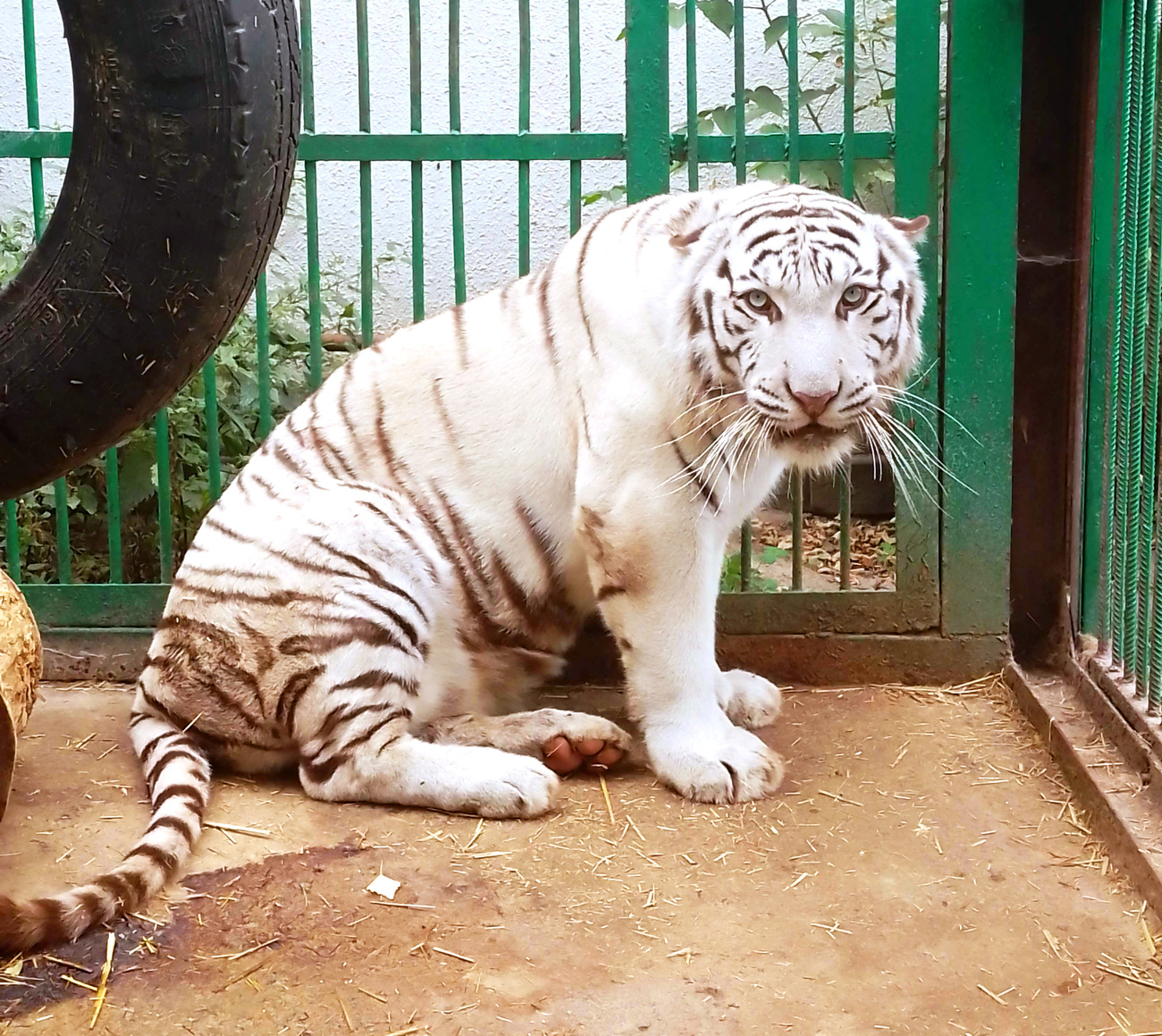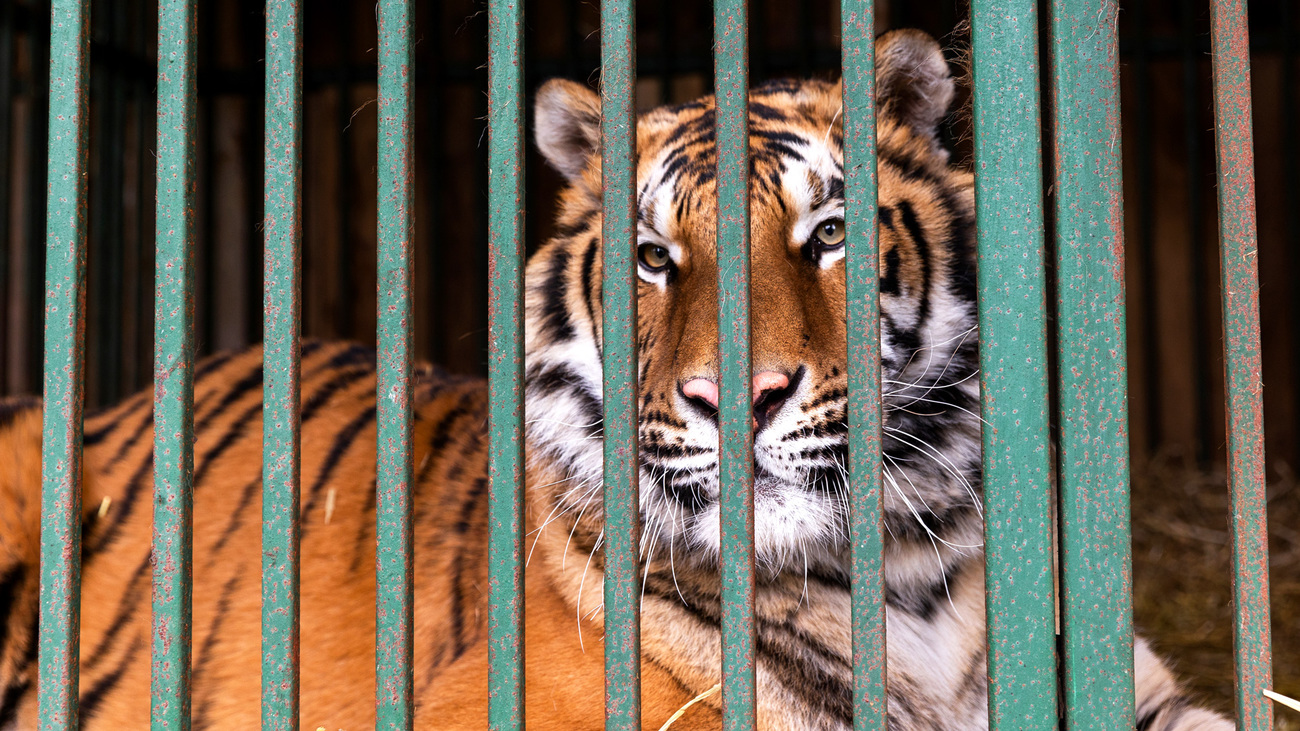Rescued big cats from Ukraine
Rescued big cats from Ukraine
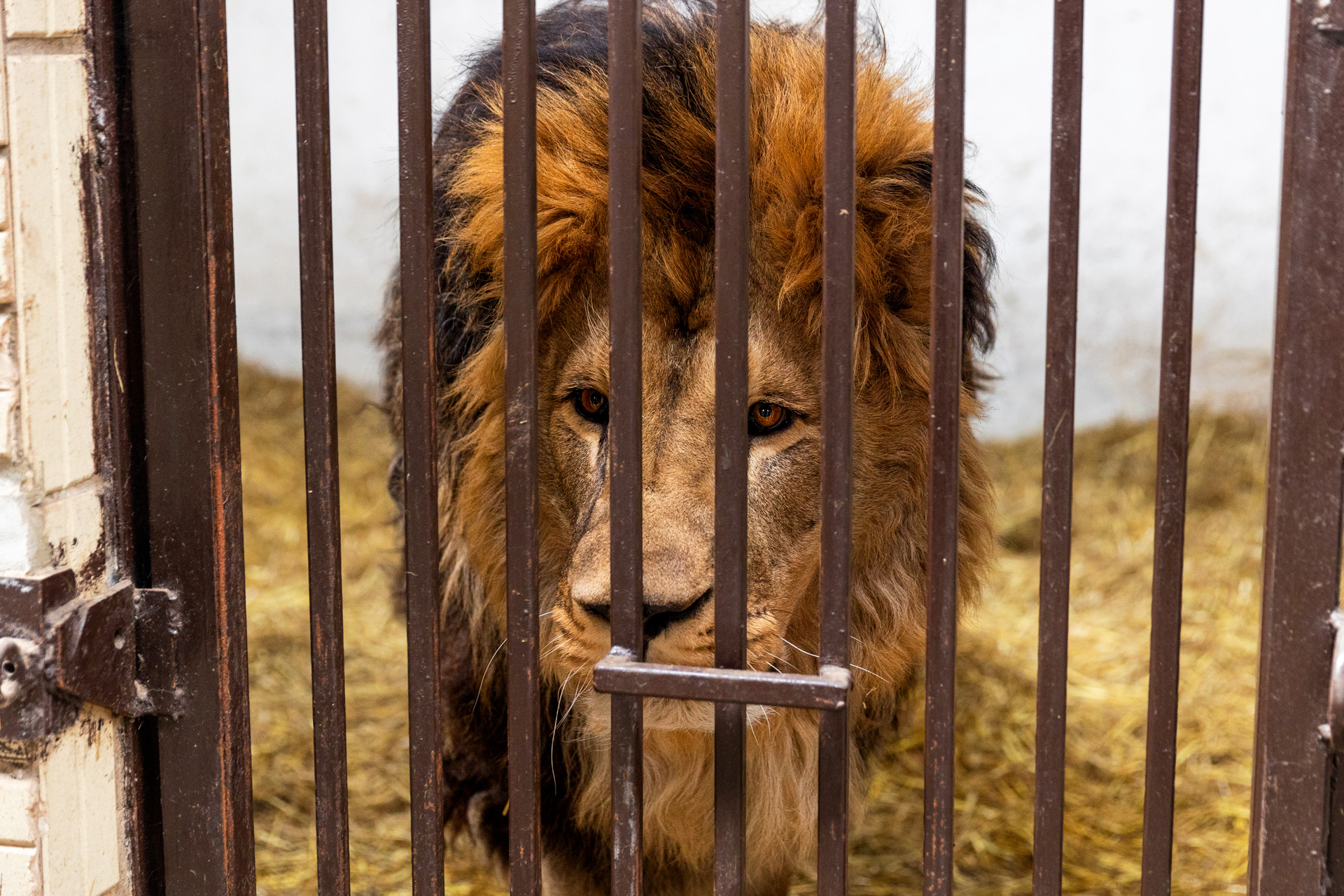
IFAW in Action
IFAW has supported the rescue and rehabilitation of big cats at Wild Animal Rescue, a wildlife rescue centre equipped to provide temporary care for wildlife like lions and tigers. Cared for by Natalia Popova, a number of large felines found temporary shelter there during the war in Ukraine and received veterinary care. Ultimately, the goal for Wild Animal Rescue is to find forever homes for them away from the conflict—places where they can roam outdoors without the threat of shelling and missiles.
Big cats—lions, tigers, leopards, and jaguars—in captivity around the world suffer in small, indoor enclosures, lacking access to healthy diets, space to move, and other members of their species. Oftentimes, they are captured as cubs or bred in captivity—sometimes kept by private owners masquerading as sanctuaries—and when the owners are no longer able to care for these large, wild animals, they are surrendered to rescue facilities or simply abandoned. This situation is only exacerbated in times of war, when these animals face the threat of explosions and armed conflict, and when their owners are forced to flee.
Our work can’t get done without you. Please give what you can to help animals thrive.
11 April 2025
A journey complete: Lion Rescue Centre officially opens
Yuna, Rori, Vanda, Amani, and Lira—these are names we will always remember. This spring, we were able to see them in their forever home, the newly opened Lion Rescue Centre.
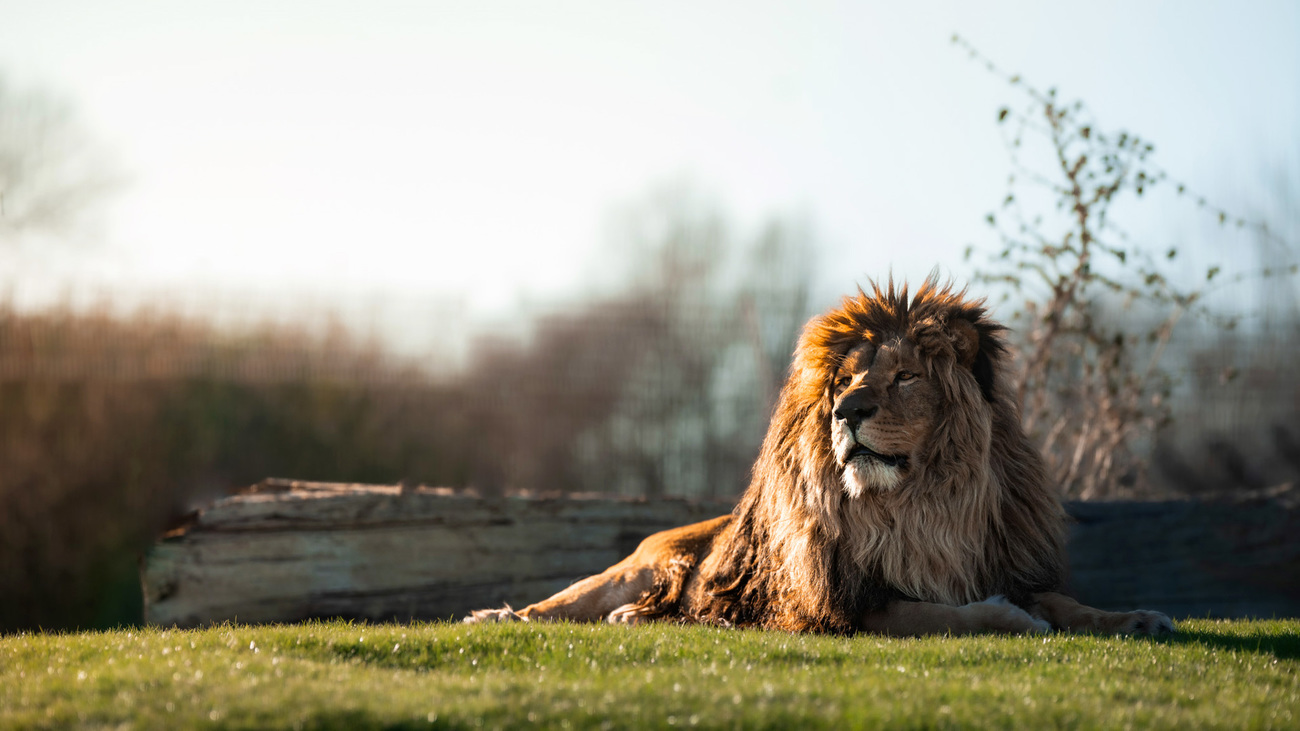
On opening day of the enclosures, we held our breath as the lions explored their new space—grass underfoot, toys to play with, fresh air all around. Once victims of cruelty and conflict, we could now see them exploring, playing, and showing off natural behaviours like stalking and roaring.
Even from a distance, across the globe, we each connected with these lions in our own way. Finding them a permanent home wasn’t easy—it took many months of waiting, worrying, and tackling one challenge after another. But it was so worth it.
Thank you for being part of the rescue to bring Yuna, Rori, Vanda, Amani, and Lira to their forever home. This marks not just the end of their journey but also the beginning of a new chapter in their lives filled with hope.
March 17, 2025
All big cats are reunited in the UK
Mission accomplished! Rori, Vanda, Amani, Lira have all been successfully transported to the UK to live out the rest of their days in peace, safely away from the ongoing war in Ukraine.
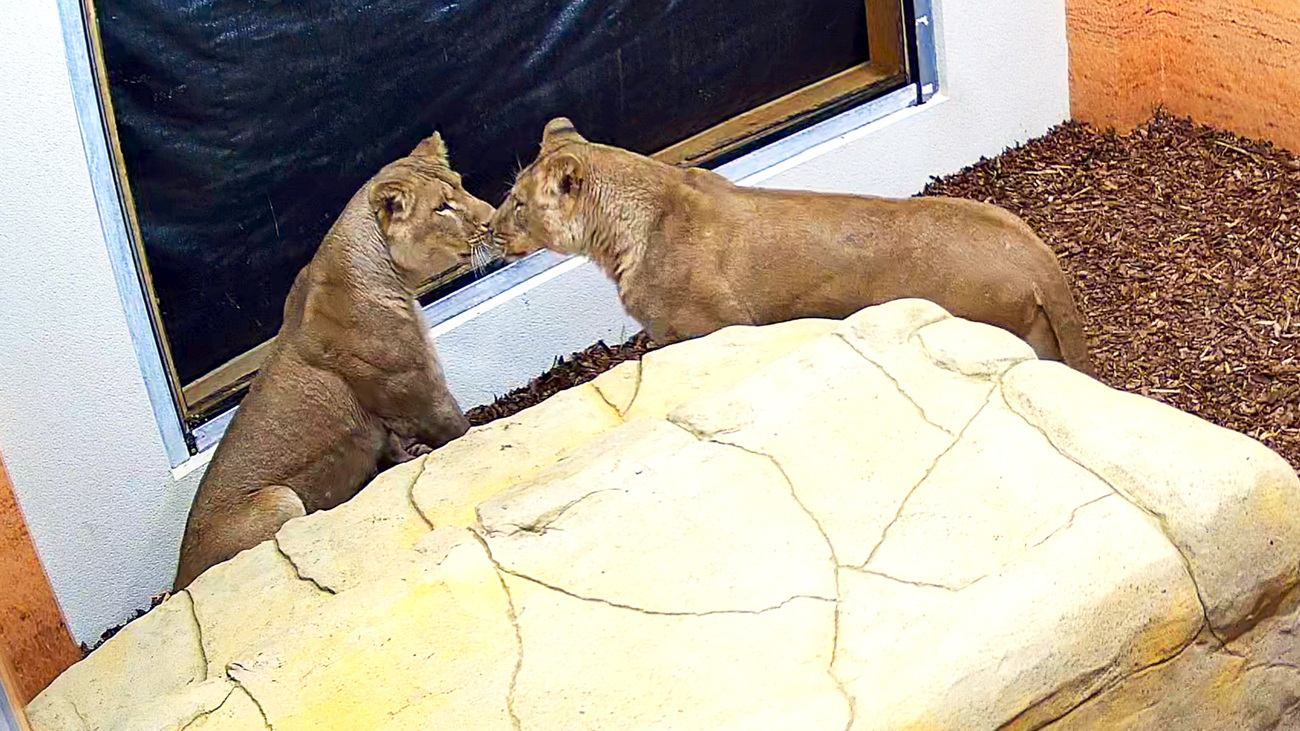
Since September, all four lions had stayed at different interim locations in Belgium, gaining strength and waiting for the day that they could move into their forever home. With the completion of the new Lion Rescue Centre at The Big Cat Sanctuary, this has been made possible. After loading each of the lions into their travel crates and transporting them for several hours over land and under water, they finally reached their destination this past weekend.
Yuna has been at the sanctuary since summer 2024 and has grown into a curious, playful and strong lady.
We look forward to seeing each of them improve their health further and showcase their wonderful, unique personalities.
IFAW sends a big, heartfelt thank you to the teams at Wild Animal Rescue, Crossborder Animal Services, and The Big Cat Sanctuary for giving these lions the best life possible!
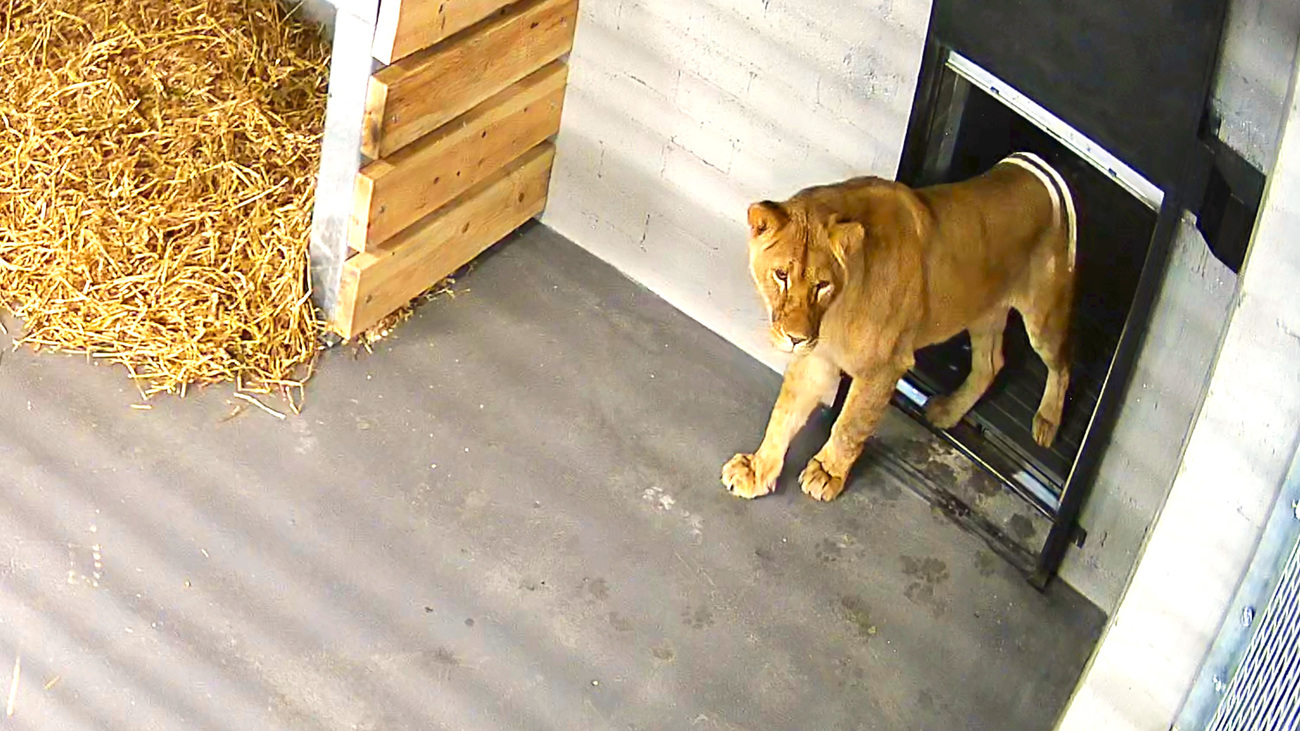
23 September 2024
Vanda, Amani & Lira arrive safely in Belgium after evacuation from Ukraine
Three more lionesses were successfully evacuated from war-torn Ukraine: Vanda and sisters Amani and Lira. Earlier this year, they had been rescued from illegal breeding and private ownership by Wild Animal Rescue. In collaboration with The Big Cat Sanctuary and Cross-Border Animal Services, the lionesses were transported over 2,000 kilometres (1,300 miles) across three countries to safety in Belgium.
Vanda has been relocated to Plankendael Zoo temporarily, while Amani and Lira are staying at Pairi Daiza in Belgium. Like the male lion, Rori, they will stay at the interim facilities until their permanent forever home, the Lion Rescue Centre at The Big Cat Sanctuary, is completed in late 2024.
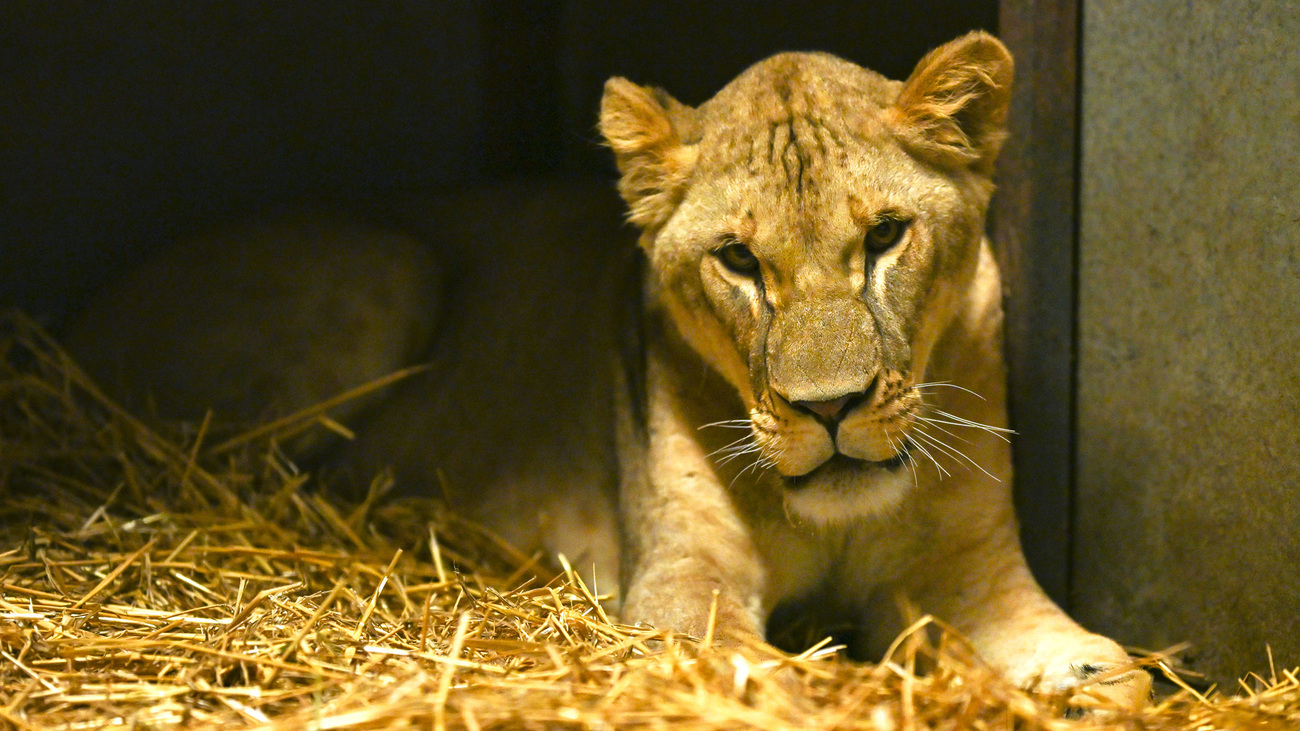
‘These are the happiest moments in my life, when animals that have suffered cruelty get a chance to live a decent life full of love and care!,’ says Natalia Popova from Wild Animal Rescue. ‘And all efforts were not in vain. Big thanks to The Big Cat Sanctuary for giving a chance for a happy future to those who need it.’
‘We’ve done it—all five lions have been successfully rescued from the war in Ukraine,’ says Cam Whitnall, Project Lead of The Big Cat Sanctuary and presenter of CBBC’s One Zoo Three. ‘We couldn’t have done this without the incredible help from Wild Animal Rescue, Cross Border, IFAW, and our team, and everyone who has donated and spread the word about this mission. Now that they’re safe, our focus is on completing the Lion Rescue Centre and bringing them all to their forever home at the Sanctuary very soon.’
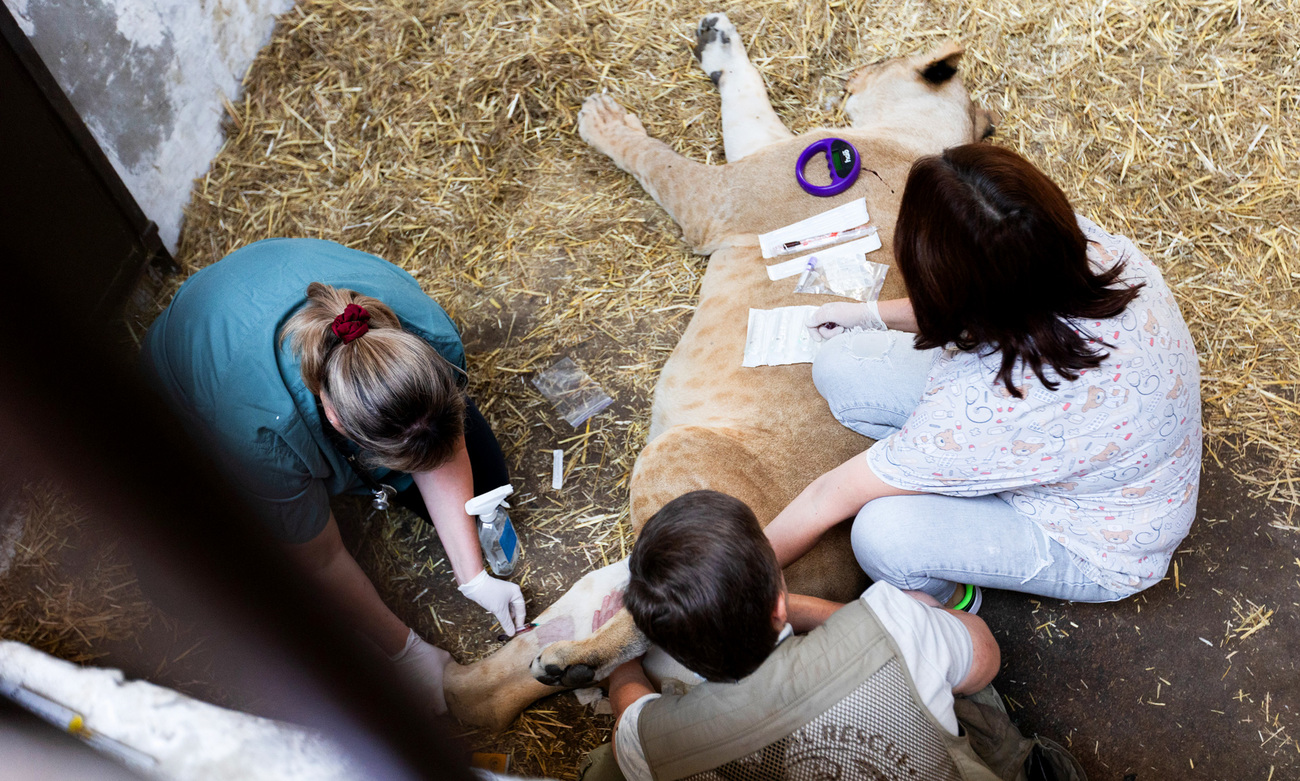
29 August 29 2024
Yuna feels grass beneath her paws for the very first time
After slowly getting used to her new surroundings, Yuna has now ventured outside and felt the grass beneath her paws for the first time in her life. After enduring confinement on a cold concrete floor in a terrifying warzone, this marks the beginning of Yuna's incredible second chance.
She has begun to reveal a playful and curious nature. She has been observed exploring her environment, engaging in natural behaviours like scratching trees and logs—activities that were impossible in her previous confined space. These playful behaviours demonstrate Yuna’s increasing confidence and are crucial for rebuilding the muscle strength and mobility she lost during her time in Ukraine.
Yuna has a quiet, off-show den with a weighing tunnel that allows her to access her outdoor area. The outside habitat features a cave, a platform, a large mound to lay up high on, a feed post, grass, trees, and planting. The feed post will allow her to use her muscles and display natural behaviours when the sanctuary team provides food and enrichment. The mound allows Yuna privacy so she can relax outside of the view of people when she goes behind it, but it also gives her a high vantage point to look out over the sanctuary.
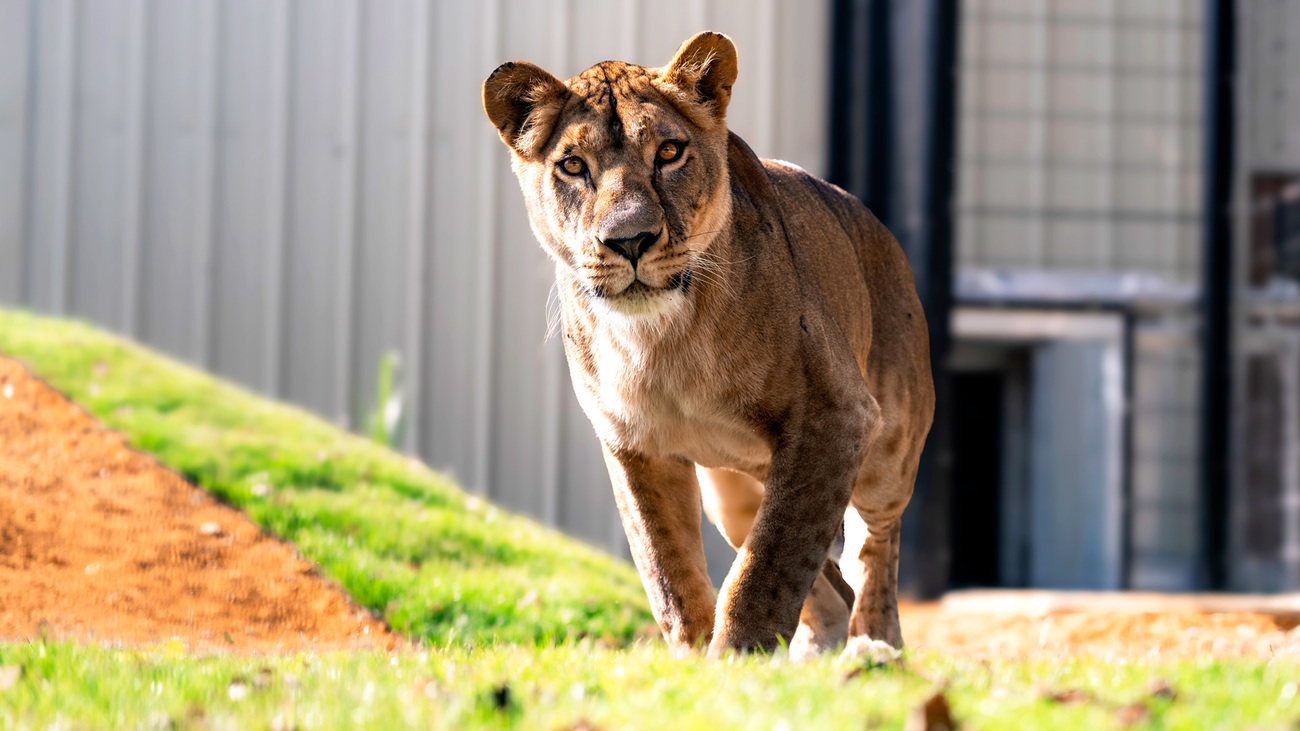
Each day, in the first week, the sanctuary team has sat near her, speaking in soft, comforting tones, gradually allowing her to adjust to their presence. As the days passed, Yuna’s initial wariness began to fade, and she began to approach her caretakers willingly. This slow, steady progress signalled a significant breakthrough in Yuna’s emotional recovery.
At the moment, Yuna is taking small chunks of horse and chicken meat and will hopefully start eating larger pieces soon. The sanctuary team are letting her out multiple times a day with two keepers around to monitor her behaviour. In time, they will give her full access to the outdoors at all times. Yuna is closely monitored by a veterinary team, and will arrange scans and a full assessment once she's settled in.
Yuna is a completely different cat from when she was in the wildlife rescue centre in Ukraine. Being outside, without constant shelling nearby, has really brought out her playful and mischievous side. She's growing in confidence every day, and we're all very pleased with her progress.
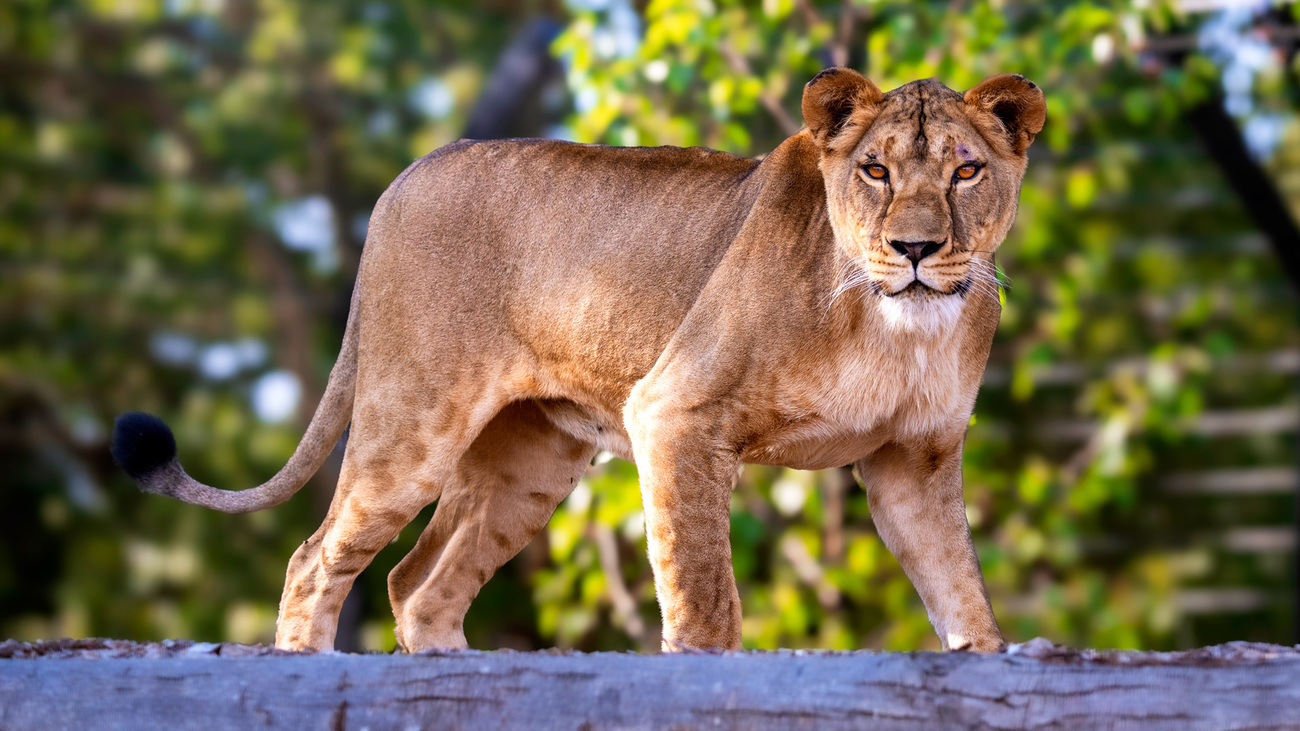
19 August 2024
Yuna arrives at her forever home
At last, Yuna has arrived at her new home at The Big Cat Sanctuary in the UK. After many months of trying to find someone that was willing to take her in, the sanctuary stepped up and said ‘yes’ to housing Yuna and four other lions in a newly built lion centre.
The journey brought Yuna through multiple border crossings and the Channel Tunnel between France and the UK. Although stressed at times while on the road, she was doing well upon arrival and has been cautiously investigating her enclosure and peeking through the door to the outside. The sanctuary team is keeping a close eye on her behavior and well-being and can monitor her via CCTV as well.
Rori is also doing well and enjoying his new home at the temporary facility in Belgium. The other big cats, Vanda, Amani, and Lira will be evacuated as soon as possible.
Follow IFAW and The Big Cat Sanctuary on social media for more updates.
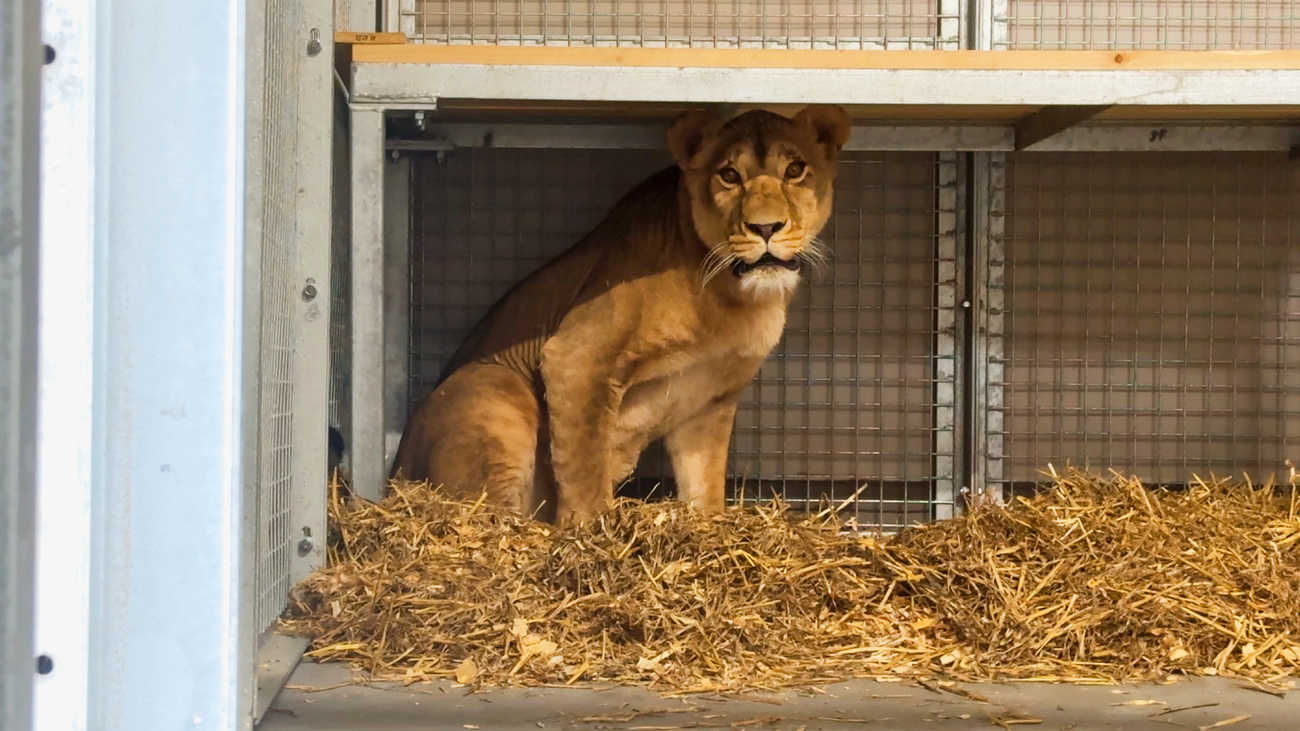
16 August 2024
Yuna and Rori on their way to safety
In the evening of Wednesday, 14 August, the team at Wild Animal Rescue prepared Yuna and Rori for their evacuation from Ukraine. After being sedated and checked by the local veterinarian, the big cats were each carried to their transportation crates. Once loaded onto the vehicle, they left the place where they had been nursed back to health after their traumatic lives in captivity and during the war.
Yuna and Rori are now traveling over 2,253 kilometres (1,400 miles) across Poland, Germany, the Netherlands, Belgium, and France towards the UK. While The Big Cat Sanctuary has immediate capacity to take in Yuna, Rori will be staying at Natuurhulpcentrum VZW in Belgium until the new big cat enclosures at the UK sanctuary are ready.
Follow IFAW and The Big Cat Sanctuary on social media for more updates.
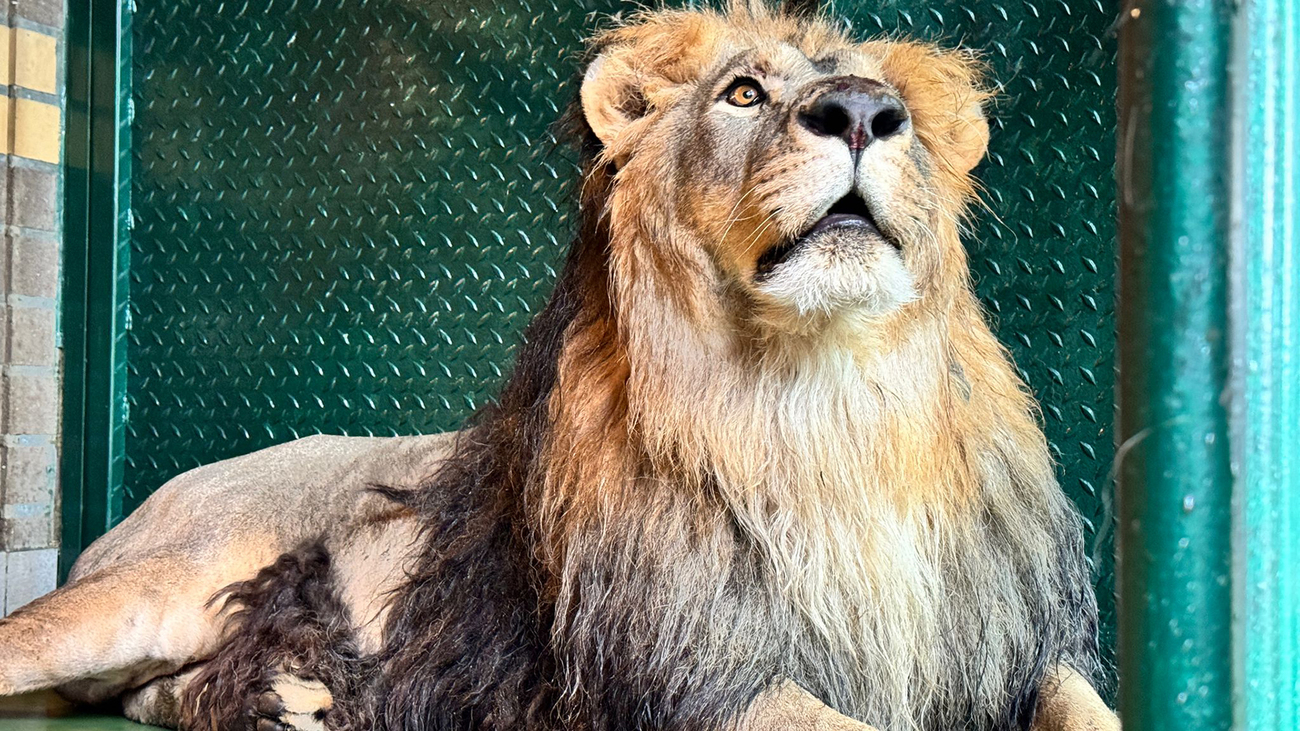
3 July 2024
We have wonderful news to share with you! After many months of conversations with multiple wildlife sanctuaries across Europe and beyond, we were approached by The Big Cat Sanctuary, who said they were interested in offering a new home in the UK to five of the big cats at Wild Animal Rescue.
The Big Cat Sanctuary is currently constructing new enclosures to accommodate lions Yuna, Rori, Vanda, Amani, and Lira. Since this will take time, some of the big cats will have to be placed at temporary facilities in Belgium for a quarantine period of about four months.
Over the past few weeks, there have been many calls and meetings to discuss the evacuations. Wildlife evacuations are complex and require a lot of preparation, especially due to the permits necessary for transporting wild animals like big cats across national borders and the EU. The teams have had to tackle many, many hurdles, but things are looking up.
Follow IFAW and The Big Cat Sanctuary on social media for more updates.
Our work can’t get done without you. Please give what you can to help animals thrive.
Rescued big cats
Yuna the lioness
Yuna the lioness was first found by volunteers in February 2023. She was kept in a private house with inadequate conditions in the north of the Kyiv region, alongside the young male lion Atlas, who was moved to Parc de l'Auxois in January 2024. Their enclosure was only three by four metres and had a bare, concrete floor.
Most likely, Yuna and Atlas were kept in captivity for illegal breeding. Their former owner informed the volunteers that Atlas had become too aggressive and dominant over Yuna, and the lions could no longer be kept in their care due to the heavy shelling the Kyiv region experienced.
Yuna and Atlas were evacuated to Wild Animal Rescue on 20 February 2023 and were separated from each other. Yuna had wounds due to her long stay on the cold concrete, and she suffered due to being overweight and having an unbalanced diet—she couldn’t even stand up.
After some time, Yuna was able to stand and walk around her new enclosure—and her weight decreased—but she still suffered from fear and stress. It didn’t help that on 2 January 2024, during a missile attack, debris fell near her enclosure. Yuna suffered a concussion due to acoustic trauma, which caused her to lose coordination. Fortunately, she recovered over the subsequent weeks and was moved indoors.
Towards the summer, Yuna exhibited much fewer signs of stress and even showed interest in socialising with other lions. Her progress meant that she was able to be evacuated in August, together with Rori. Yuna is now at her new home with The Big Cat Sanctuary in the UK, and has been enjoying exploring her enclosure. Her physical appearance has already improved a bit and she clearly has a very curious and playful nature.
Vanda the lioness
Vanda is a one-year-old lioness who was rescued from an apartment in southeastern Ukraine. Kept as a family pet, she lived without sun, the outdoors, and a proper diet. Her owners called Wild Animal Rescue when they could no longer care for her, and Natalia found her heavily underdeveloped—she looked only three to four months old—and with parasites and inflammation.
Vanda was put on a treatment plan and an adjusted diet. In September 2024, she was evacuated from Ukraine together with Amani & Lira, and brought to a temporary facility in Belgium. Once the new enclosures at The Big Cat Sanctuary are ready, she will be moved there and join Yuna, Rori and the two sisters at their new forever home.
Amani and Lira the lionesses
In January 2024, Wild Animal Rescue took in Amani and Lira, two sister lionesses who were less than a year old. They were rescued from a breeding facility where they were kept in a single enclosure with their mother and father. Fortunate enough to have been nursed by their mother, they were in relatively good health.
Natalia took the two sisters and made an agreement with the owner to keep the parents (ensuring the male was vasectomised) and provide them good care.
Amani & Lira were evacuated from Ukraine in September 2024, together with Vanda, and brought to a temporary facility in Belgium. Once the new enclosures at The Big Cat Sanctuary are ready, they will join Yuna, Rori and Vanda at their new forever home.
Rori the lion
Rescued from the Sumy region of Ukraine, Rori is a male lion who was likely used for illegal breeding. The menagerie where he was kept was disbanded at the start of the war, and the area was heavily shelled, which meant the team was unable to rescue him until 18 January 2023.
When they found him, Rori couldn’t stand, suffered from serious coordination disorders, and had likely experienced a concussion. After two weeks, he could stand on his paws, and over the past year, he’s shown improvements in his movement and coordination.
Months later, Rori still had some coordination problems and was in need of more space. Luckily, in August 2024, he was evacuated to Natuurhulpcentrum in Belgium, where he is now waiting until his new enclosure in The Big Cat Sanctuary in the UK is ready, which will be his new permanent home.
Alex the tiger
Found by military volunteers in November 2022, a male white tiger named Alex was kept in the Kharkiv region in a private yard. He lived in poor conditions, unattended and even surviving without food for some time. His owner was not found and likely had died or evacuated.
In December 2022, Alex arrived at Wild Animal Rescue. He was severely weak and stressed, had lost a lot of fur on his back, and experienced impaired joint mobility. He was very hungry and actively looking for food. The veterinarian diagnosed him with enterocolitis (intestinal inflammation), extensive dermatitis (skin inflammation), and ataxia (not being able to walk).
On 25 February 2023, Alex finally stood on his paws. Though still a little overweight, his health improved in the months that followed. Wild Animal Rescue is hoping to soon find him a forever home that will suit his needs.
Mir the tiger
After his private owner was forced to flee Ukraine, Mir the tiger was handed over to Wild Animal Rescue on 11 April 2023. A one-year-old male tiger, Mir once lived in the yard of his owner’s home in the Kyiv region. When he arrived at the rescue centre, he was in good health.
Mir’s name means ‘peace’ in Ukrainian. Currently, he lives alone in an indoor enclosure, as there is not enough space for him outside—but he is in good health and remains active and curious. Wild Animal Rescue hopes to move him as soon as possible to a new, safe home where he will have plenty of outdoor space.
